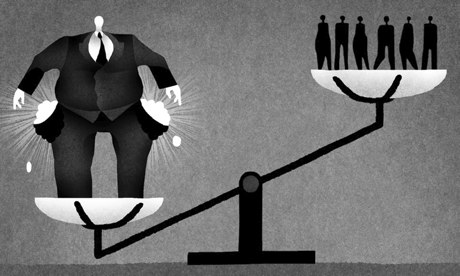The richest 85 people in the world have
as much wealth as the poorest 3.5 billion – or half the world's entire population – put together. This is the stark headline of a
report from Oxfam
ahead of the World Economic Forum at Davos. Is there a reason why the
world's powerful, gathering at the exclusive resort to sip cognac and
eat blinis, should care? Well, yes.
If one subscribes to the
charitable view that neoliberal philosophy was simply naive or misguided
in thinking that "trickle down" would work infinitely, then evidence
that it doesn't, should be cause for concern. It is a fundamental
building block of supply-side economic theory – the tool of choice these
past few decades for those in charge to make adjustments. The
realisation that governments have been pulling at economic levers which,
for some time, have been attached to nothing, should be a wake-up call
to the deepest sleepers.
Even if one subscribes to the cynical
view that the elite knew what they were doing all along, observing that
the "rising tide" is lifting fewer and fewer boats and leaving more and
more to rot in the sediment – both at a personal and national level –
must make most wonder "am I in the right boat and is it big enough?"
Concentration is rampant. Credit Suisse estimates that the world will
have
11 trillionaires within two generations.
It
is not so much that the supply-side principle "if you build it, they
will come" is no longer true. It is more that we appear to have passed a
tipping point, where so much wealth has been concentrated at the top,
they no longer need bother to "build" anything. In short, it has become
more economically efficient to buy countries' economic policy than to
create value in order to sell it on. If one can control government to
favour the richest, while raising barriers for new entrants, thus
increasing their share of the pie exponentially, what is the incentive
to grow the pie?
This applies to both companies and individuals.
Small business gets clobbered by taxes and business rates, while big
business turns around and says to the state: "This is how much tax I
fancy paying this year, take it or leave it". The rich no longer create
jobs, through a process of consolidation, takeover and merger, they
actually destroy them.
Zero-hours contracts
are the way of the future; in a society that is hungry, desperate and
devoid of political engagement or unionism, why would anyone offer terms
and conditions that give individual workers any standing?
And
yet, the realisation must dawn soon – one hopes – that this model is
unsustainable because its effects are uncontrollable. The more unequal
we become as a society, the faster the
top's earnings diverge from the bottom's.
"When so much of the purchasing power, so much of the economic gain,
goes to the very top," Bill Clinton's former labour secretary Robert
Reich explains in the film
Inequality For All.
"There's simply not enough purchasing power in the rest of the
economy." At the same time, there is far too much loose cash sloshing
around at the top, leading to unwise risks and toxic investments. Wealth
inequality in the US was at its highest levels, historically, in 1928
and 2007, one year before its two biggest financial crises, notes Reich.
The base of the pyramid atrophies and begins to crumble.
Then why
are most governments continuing to fiddle with supply-side levers in
order to revive the economy, when it is abundantly clear it does not
work? The simple answer is in two parts. First part: habit. The second
was
perfectly expressed
by the creator of The Wire, David Simon: "That may be the ultimate
tragedy of capitalism in our time, that it has achieved its dominance
without regard to a social compact, without being connected to any other
metric for human progress."
We have come to measure, to an
increasing extent, individuals' success by their wealth, spending power
and other assorted trappings. We do the same with the economic success
of governments; measure it by an aggregated data set that fails to take
into account wealth distribution, educational achievement, innovation,
or even the welfare and health of the population they claim to
represent. We must shift this perspective. It will be the hardest,
simplest thing we have ever had to do as a species.


No comments:
Post a Comment